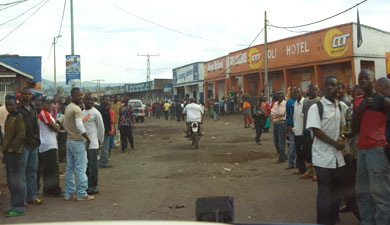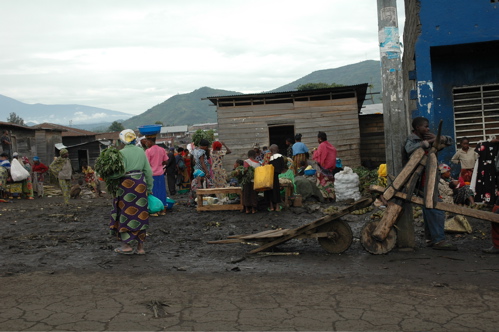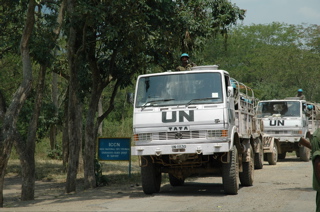
Suggestions Offered for Candidates to Break Their Silence

Photo Marie Frechon / MONUC
This email plea was received in the past few days and reflects the growing food and supply crisis in Congo.
Once more to tell you the truth, what we are expericing in Goma is dreadful.Anyway after that night of Wednesday, which was a nightmare indeed, life is starting slowly.Banks and shops have not started working , we do not go to work, we do not know when we will be paid, we have no food, but we hope peace will come back.
The UK has also called for urgent relief.
The current tragedy in the Democratic Republic of Congo is not an "ethnic conflict," as reported by the US State Department and seconded by the candidates. It is a proxy war, fueled by international competition for the vast mineral wealth of Congo.
Reading a prepared statement from the United Nations Secretary General, U.N.spokeswoman Marie Okabe, Ban said last week, "the intensification and expansion of the conflict is creating a humanitarian crisis of catastrophic dimensions and threatens dire consequences on a regional scale."
There is currently a tentative cease-fire, but reports from the road leading north out of Goma say refugees are cautiously negotiating roadblocks manned by National Congress for the Defense of the People (CNDP). These villagers are trying to return to their homes, and many of them have spent days with their families, including infants and small children, sleeping in the bush.
Madnodje Mounoubai, Press Information Officer (PIO) for MONUC in Kinshasa told us Sunday morning,
"The situation in Goma is calm now but remains tense. There is no new fighting reported since the unilateral ceasefire declared by CNDP of Laurent Nkunda. So the ceasefire is holding."
However, the humanitarian crisis has worsened. "The displaced people estimated at 250,000 in and around Goma are still awaiting for assistance. OCHA and the NGOs are currently assessing the situation and assistance has started."
The Special Representative of the Secretary General for the peacekeeping mission in the Democratic Republic of Congo, Alan Doss, has been giving journalists more details of what's been happening on the ground in North Kivu.
Over ten years of war propagated on a scramble for the vast resource wealth of the Democratic Republic of Congo has intensified in recent weeks as "rebel" leader General Laurent Nkunda (CNDP) intensified his offensive against the regular Congolese army (FARDC) and threatened to take the city of Goma, headquarters of MONUC, the United Nations Mission to Congo.

Image: Goma 2007
The territory that Nkunda controls is rich in minerals and offers access to the Rwandan and Ugandan borders.
Nkunda accuses the Congolese army of siding with Rwandan Hutus who took part in the 1994 genocide in Rwanda of Tutsis and moderate Hutus. Journalist Johann Hari sets the record straight when he states:
"There are two stories about how this war began - the official story, and the true story. The official story is that after the Rwandan genocide, the Hutu mass murderers fled across the border into Congo. The Rwandan government chased after them. But it's a lie. How do we know? The Rwandan government didn't go to where the Hutu genocidaires were, at least not at first. They went to where Congo's natural resources were - and began to pillage them. They even told their troops to work with any Hutus they came across."
MONUC (UN Mission in Congo) reports, "The situation in Goma was relatively calm Thursday after the events that affected the population in North Kivu and a night of agitation with sparse gunshots in the city of Goma. MONUC received information about cases of looting, theft, rapes and even murder. It condemns all these acts which are very often attributed to men in uniform."
Today (Sunday) MONUC PIO Madnodje Mounoubai says that the regular army (FARDC) is under control but that there are "desertions."
Last week Reuters' reports indicated that FARDC was out of control, with troops involved in drunken looting, and there is a report that a soldier was arrested for killing the civilian owner of a restaurant.
The U.N. Security Council unanimously issued a statement that "condemns the recent National Congress for the Defense of the People (Nkunda) offensive ...and demands that it bring its operations to an end."
The Security Council statement also asked the governments of Congo and neighboring Rwanda "to take concrete steps to defuse tensions and to restore stability in the region."
Rwanda has once again denied any involvement or support for the conflict through its U.N. Ambassador Joseph Nsengimana.
However, the United Nations has remained consistent over the last seven years in its condemnations of Rwanda and the government of Paul Kagame for looting of Congolese resources under the pretext of national security.
Reporters Without Borders has called Rwandan President Paul Kagame one of the world's "Predators of Press Freedom."
The Congolese government in Kinshasa has accused Rwanda of supporting Nkunda.
The State Department has condemned the actions of Laurent Nkunda, but remained silent on the Kagame government's covert support of the Nkunda offensive.
Jendayi Frazer, the Assistant Secretary of State for African affairs, said Nkunda and the CNDP will be held accountable for actions in Goma. She is meeting in Kinshasa with Louis Michel, EU Commissioner for Development and Humanitarian Assistance; and the French and British Foreign Ministers are also in talks, PIO Madnodje Mounoubai said.
"I should say, they should not go into Goma, they will be held accountable for actions taking place (there). They should return to a political process," Frazer said from Nairobi last week.
However, Frazer appears to be coddling the Kagame regime with her statement:
"We have no evidence that Rwanda is fighting directly in eastern Congo, but we
do believe that Rwandan territory has been used to provide support to CNDP. It
is a very, very easy border to cross, supplies can go back and forth easily,"
Human Rights Watch says:
"High-ranking Rwandan authorities deny that they are giving any assistance to Nkunda, but Human Rights Watch has evidence that Nkunda recruits hundreds of his most experienced troops within Rwanda, many of them demobilized soldiers from the battle-hardened Rwandan army. Although exact numbers are not known, the fact that some 200 Rwandans have left Nkunda's ranks over the past 18 months to enter a UN-run demobilization program for repatriation to Rwanda provides some idea of the scale of this problem."
Kagame rules Rwanda with an iron fist. It is impossible to believe that the President of Rwanda does not know what is happening in his country, which is about the size of Maryland.
Conservation Wars?
To make matters worse, the American public opinion has been hijacked by a tremendous public relations campaign waged by "conservation" groups in DRC. Consider this recent posting on a private Yahoo Forum, primate-net@yahoogroups.com:
"Thank you, [name redacted], for keeping us posted about the dire situation in DRC. Whichever candidate wins the presidential election on November 4th; we can both pray and try to influence him to do something to prevent the extermination of gorillas and park rangers there."
1.5 million refuges, six million dead, and public sympathy in the United States is focused to a large extent on gorillas and park rangers who are possibly part of larger mercenary effort in Virunga Park. This video was completed in 2006 and clearly shows park rangers torturing and frightening innocent villagers.
In the new book "Green Inc.," conservation insider Christine MacDonald paints a grim picture of conservation abuses worldwide.
"People have been evicted from their traditional homelands on every continent. Rodolfo Stavenhagen, the United Nations special Rapporteur on the human rights and fundamental freedoms of indigenous people, has denounced forced displacement as one of the biggest threats facing indigenous people in dozens of countries. In Africa alone, the evictions induced by conservation efforts are estimated in the millions of people. Oftentimes their homes, fields, and grain stores are burned and they are forced to move into villages with no compensation for their losses and minimal assistance creating new means of survival."
MacDonald terms these people "conservation refugees," and quotes tribal leaders who speak of beatings at the hand of conservationists and murder.
What is our humanitarian policy in this conflict zone? The candidates have offered no idea where they will stand on this important issue.

Image: MONUC in Virunga 2007
Suggestions For Candidates
Friends of the Congo has offered OffTheBus and Huffington Post this point-by-point list of suggestions to the candidates for consideration.
It is time that world leaders take on this issue and contribute to bringing an end to the conflict in the Congo. There are several steps that can be taken to establish a path to an end to the conflict and peace:
1. We must be clear that the conflict is not an ethnic one but a resource war
2. There is no military solution to the crisis only a political one
3. Rwanda must be fully engaged for the strife in the Congo to end
4. Pressure must be brought on President Kagame to cease his support of proxy forces in the Congo5. Friends of Kagame such as Bill Clinton, Tony Blair, Bill Gates and Rev Rick Warren can play a crucial role in speaking to their friend President Kagame about being an agent for peace rather than serving as a destabilizing force in the Congo.
5. A political dialogue must be initiated to get the Rwandans in the Congo back into political life in Rwanda. As for those who have committed crimes against humanity, they must be punished
6. A national reconciliation process needs to be initiated in the Congo, as was a call for Congolese delegates to the Inter-Congolese Dialogue in 2002.
7. Congo's natural resources need to be the domain of the Congolese and not select elites
Whoever wins this election must engage with and solve this grave humanitarian crisis.
Note: This writer was a MONUC accredited journalist in DRC in 2007. In full disclosure, I was involved in producing a charitable CD compilation for rape victims in DRC which is being distributed by FOTC.
